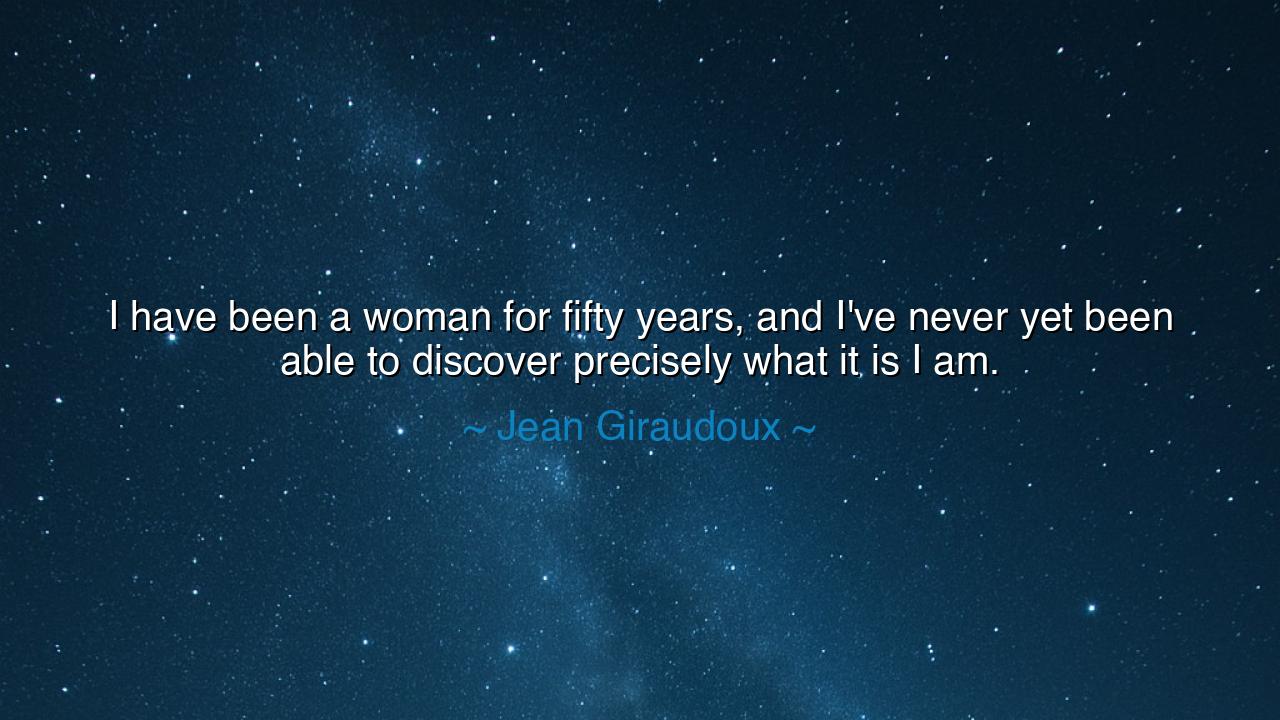
I have been a woman for fifty years, and I've never yet been
I have been a woman for fifty years, and I've never yet been able to discover precisely what it is I am.






Jean Giraudoux, the French playwright of wit and paradox, once declared: “I have been a woman for fifty years, and I’ve never yet been able to discover precisely what it is I am.” In this confession lies not ignorance, but a profound recognition of mystery. To be woman, or indeed to be human, is not a fixed definition carved in stone but a living river, ever-changing, elusive, and rich with depths that cannot be fully measured. His words unveil the folly of those who try to capture identity in rigid form, reminding us that the self is greater than any label.
The essence of his wisdom is that identity is not a puzzle with a single answer, but a journey. One may live fifty years, or a hundred, and still stand in wonder before the question: What am I? For within every soul are contradictions—strength and tenderness, wisdom and folly, passion and restraint. To be woman, as Giraudoux frames it, is to embody many faces across time: daughter, lover, mother, leader, dreamer. None alone defines the whole; together, they form an endless mystery.
History offers us mirrors of this truth. Consider Hypatia of Alexandria, philosopher, mathematician, and teacher, who in the fourth century defied the narrow definitions her society sought to place upon her. Was she a scholar? A pagan? A symbol of resistance? To her enemies she was one thing, to her disciples another, but the truth of her being could never be captured in a single word. Like Giraudoux’s claim, her life reminds us that no woman can be fully contained by categories others impose.
This saying also challenges the arrogance of certainty. For too often societies have sought to dictate what a woman is: servant or goddess, mother or muse, fragile or fierce. Giraudoux, with irony and humility, acknowledges the failure of such definitions. If even after fifty years one cannot discover precisely what one is, how can others presume to know? His words become a shield against narrowness, a call to honor complexity and embrace the unknown.
Let this teaching be remembered: the self is not a definition, but a mystery to be lived. To be woman—to be human—is to dwell in wonder, to resist confinement, to grow and change beyond measure. Jean Giraudoux’s words, spoken with playful humility, pass down to us a truth of great power: that we are not puzzles to be solved, but oceans to be sailed. And the wisest among us will not seek to cage the infinite, but to marvel at its depth.






TBvũ tiẻu bang
Jean Giraudoux’s reflection on her own identity raises a poignant point about the search for meaning and self-awareness. It’s not just about being a woman, but about the broader human condition—why are we always in search of something deeper within ourselves? Can we truly define who we are, or is self-identity something that’s always evolving? Do we ever really get the full picture of ourselves?
KFKen ff
This quote seems to express a frustration that many women may feel when trying to define their identity. In a world that constantly reinforces gender roles, is it any wonder that Jean Giraudoux struggled with what it means to be a woman? How many of us are still searching for our true selves, untainted by the external pressures that come from family, media, and culture? Perhaps the quest for self-understanding is ongoing.
TTTran Dang Thuy Tram Tran
The way Giraudoux grapples with her own identity resonates with the idea that self-understanding can be elusive. Women, in particular, are often placed in boxes by societal expectations, yet this quote suggests that these boxes don’t always fit. How can we reconcile who we are with what we are expected to be? Is this a universal human experience, or does it take on unique meanings in the context of gender?
VANguyen viet anh
Jean Giraudoux’s words seem to express an existential crisis that may be particularly relatable for women who have lived through changing social norms. Does being a woman in a constantly evolving society make it harder to understand our roles? Perhaps this quote also raises the bigger question of whether anyone truly knows who they are, even after many years of life experience. Is it possible that identity is fluid and ever-changing?
DDQuynh Dan Dao
This quote speaks to the complexity of self-identity and the pressure of societal expectations. For many women, the question of 'what am I?' can be compounded by outside influences—family, work, and culture. How do we balance our own understanding of ourselves with the labels and roles society assigns to us? Does anyone, regardless of gender, ever fully understand themselves in the context of their societal roles?